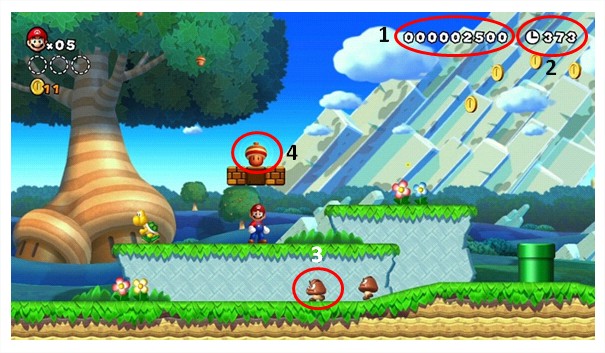One of the great things about games is how they handle objectives. Very rarely will you play a game these days that sets out one huge objective and just leaves you to it, they all break the main objective into sub-objectives. You tend to have an overall story line or a quest. This is then broken down into levels, missions or sub-quests, these are then further broken down into objectives, goals or tasks.
One of the main reasons for this, is that it is much easier for us to manage short term goals than long term goals. This can be attributed to things like how we process data, how our memories work, how we handle decisions etc. The further away a decision is, the more abstract it is to us (according to Construal Level Theory), the closer it is the more concrete. What this means to us here is that long term goals or objectives are hard for us to focus on properly, they seem to abstract, unreal. Short term goals are closer to the now and so feel more real and more importantly attainable.
From a purely human perspective, things that are really far away, very large in perceived scale or just plain hard to do, can be intimidating. The way games handle this is to break things down into smaller lumps. The larger or more complex the task the more sections you need to break it down into.

Take an everyday educational example. Counting. You don’t just tell a child to count to 100, you get them to count to 5, then 10, then 20 etc. Times tables, you start with the easy stuff like 2 times tables, 5 times tables, 10 times tables then move onto the 9s and 12s.
A more practical example, that many of you have probably come across at some stage, is the humble form or questionnaire. When you are presented with 100 questions that cover everything from your name to your inside leg measurement – it can be rather off putting.
Instead, how about present 10 pages of 10 questions. Add a progress bar that shows how far into the survey you are, then (and for the love of God I hope someone is listening) a simple save system. That way, people are only seeing 10 questions, a much more manageable number. The progress bar lets them know they are actually making, well, progress. The save option lets them know that you actually care about their time and are happy for them to fill the form in how they want!
So, the takeaways!
- Big tasks / Long term goals = scary
- Small tasks / Short term goals = manageable
Similar Posts:
- Mario as a Metaphor for your Career
- Progress: My Desert Island Gamification Element
- Experience Points and Gamification – Getting it Wrong




Yes, finally an approach that fits my idea of gamification. It will come in more handy in regard to processes and workflows. If you put the idea a little bit further why not integrate other mechanics like RPG exp., ressources connected with real workflow and so on. Gamifying the whole work process would be very interesting. Andrzej, Andrzej, we got a matching mindset about the use of gamification.
Thanks Sebastian.
It can all be used, just need to use it with care and remember you are dealing with grown ups!! That is where many go wrong 😉
That is the point: “grown ups”. I don’t like badges and ranks either. For me it is more about the the connected and transfered possibilities of gamification. But interesting you bring that point of age, experience and passion up. (things how I define grown ups) Do you really think thats the point of failure of gamification?
The failure is bad design. Under or over estimating your end users. Not defining you actual goal, rather just wanting to use gamification for something! Badges etc can work, but only for targeted or short term uses.
There you go. Badges for the short win. Thats an approach I can live with. Did I mention that I really like this post?
hehe thanks 😀